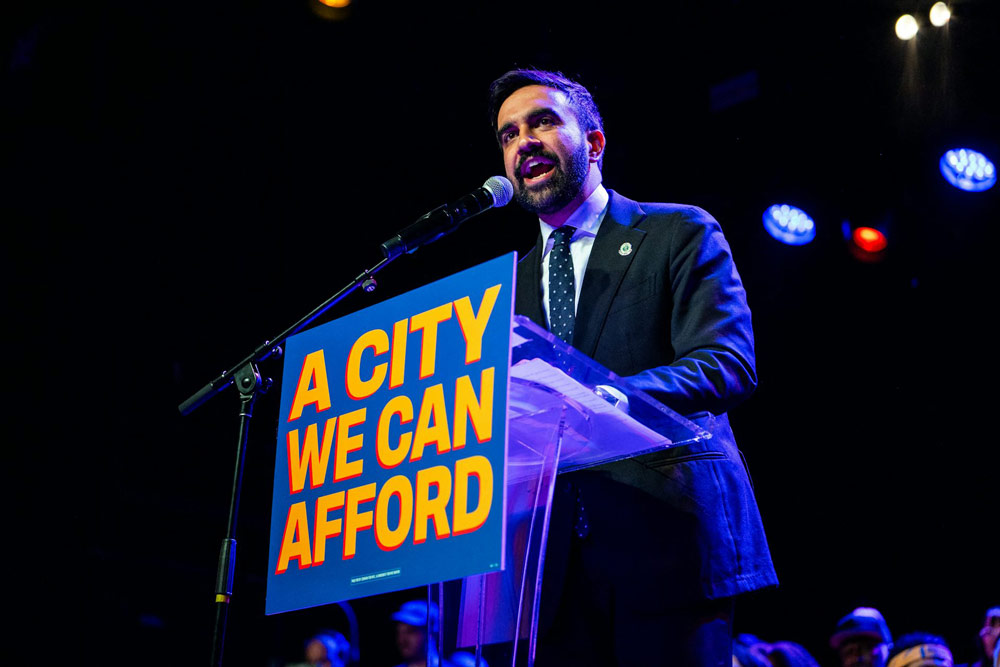Written by Lincoln Mitchell
Prominent Democrats and Republicans are discussing the unexpected ascent of 33-year-old state representative Zohran Mamdani, who defeated more seasoned politicians in the Democratic mayoral primary in New York on June 24, 2025.
President Donald Trump swiftly launched personal attacks against Mamdani, but other established Democratic leaders say they are worried about how the progressive ideology of the democratic socialist could hurt the Democratic Party as a whole and drive away more centrist voters.
With a diversified population and a long history of liberal politics, New York is a distinctive American metropolis. So, is a New York primary mayoral election any indication of what would occur elsewhere in the nation?
Lincoln Mitchell, a political strategy and campaign expert who teaches at Columbia University, talked with Amy Lieberman, a politics and society editor at The Conversation U.S., to find out what Mamdani’s primary victory might mean for the future of American politics.
Does Mamdani’s victory in the primaries provide any clue as to how the Democratic Party may be changing nationally?
It is obvious that Mamdani’s victory represents a critique of the Democratic Party’s more business-oriented faction. I am aware that some people believe that New York is not like the rest of the nation. However, New York Democrats are no longer as separate from Democrats across the nation from a political standpoint.
The reason for this is that America as a whole is far more diverse now than it was in the past. However, progressive politicians are now elected from all over the country, not just in major cities like New York, and they are represented in both state legislatures and the House of Representatives.
The former governor of New York, Andrew Cuomo, had a dreadful mayoral campaign. He attempted to form a political alliance that is no longer viable, consisting of orthodox and conservative Jews, white New Yorkers from the outer boroughs, and majorities of African Americans. That was a strong coalition thirty or forty years ago. It was unable to form a majority today.
Mamdani understood that a progressive coalition in New York in 2025 would appear different than it has in the past, so he envisioned and developed what it may look like. Young, white individuals, many with college degrees, who are concerned about cost, as well as ideological leftists and immigrants from the Global South, which includes the Caribbean and portions of Africa, South Asia, and South America, formed the foundation of Mamdani’s alliance.
What policy issues unite Mamdani’s supporters when you refer to a new type of political coalition?
What I would describe as redistributive economic policies, which have long been at the heart of the progressive agenda, were reframed by Mamdani. A key component of his campaign is affordability, which is a masterful political marketing tactic since who opposes affordability? He proposed certain initiatives pertaining to affordability, such as promising free buses, that generated considerable interest. Free buses are fantastic, but the majority of working-class and impoverished New Yorkers will still utilize the subway to get to work.
He has been accused of antisemitism and has been harshly critical of Israel.
The late Congressman Charlie Rangel and other leftist politicians in older New York were extremely anti-Israel.
Mamdani realized that the progressive part of the Democratic Party in modern-day America does not give a damn if someone is, sounds like, or approaches being antisemitic. For those individuals, labeling someone antisemitic sounds Trumpy, and they see it as a right-wing insult rather than a valid way for Jews to voice their concerns. Although antisemitism is genuine, some liberals believe that accusations of it are only made by conservatives to disparage or harm progressive politicians.
Therefore, Mamdani’s past on the Jewish question did not hinder him during the campaign; nonetheless, he will not be able to run New York City unless he makes amends with Jewish voters.
In what other ways did Mamdani win over a base of supporters?
Limousine liberals, particularly wealthy, well-known, progressive individuals, backed him. He had a number of fans, including the actress Cynthia Nixon and model Ella Emhoff, Kamala Harris’s stepdaughter. It became fashionable, perhaps mandatory, for some rich New Yorkers to support Mamdani.
In addition, Mamdani represents a new generation of immigrants and is a true New Yorker. His parents are Indian and Ugandan. However, he is also the product of great fortune; his father is a distinguished professor, and his mother, Mira Nair, is a well-known director. Mamdani attended prestigious New York schools and is adept at playing with white people and in affluent circles. Despite having Muslim ancestry from the Global South, he is not dangerous because he speaks their language.
For immigrants and people of color, Mamdani is also one of them. Mamdani brought the Bangladeshi aunties and limousine liberals together because of his fascinating background.
Lastly, Mamdani far outperformed other Democratic contenders on the charisma measure. Who will produce better TikTok videos—the attractive young man whose mother is a well-known film producer, or the older man who is a devoted husband and parent but exudes a sense of dependability rather than that of a hip young man?
Is New York City’s politics so different from those of the rest of the country?
Though not quite a Mamdani coalition, I believe there is a chance for something akin to one at the federal or state levels. However, in a state like Oklahoma, there are folks who are struggling financially and who would also benefit from a Democratic campaign that emphasizes affordability. For this occasion, Mamdani reconstructed a progressive coalition in New York. Other progressive leaders ought to take inspiration from that and rethink a successful alliance in their district, state, or city.
At the very least, Trump prioritized lowering the cost of groceries during his campaign. One of the few Democrats who reclaimed the affordability issue from Trump and confronted it in a more direct, truthful, and pertinent manner is Mamdani. One of Trump’s slogans is “Make America Great Again!” For Trump supporters, that is a common motto on baseball caps.
Mamdani could simply put “Affordability” on a baseball cap if he wants to produce one. Boom.
That affordable strategy can be adopted by other Democratic leaders and reframed to be more effective in Kansas City or elsewhere.
![]()
Lincoln Mitchell teaches at Columbia University’s School of International and Public Affairs.







